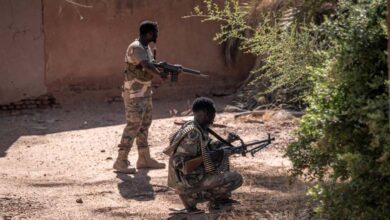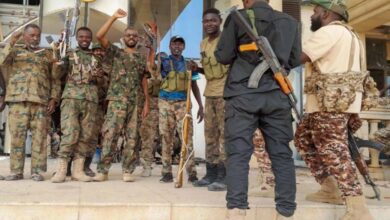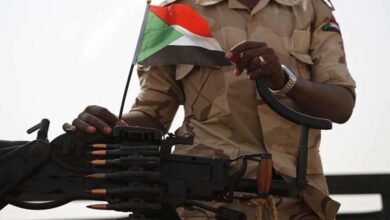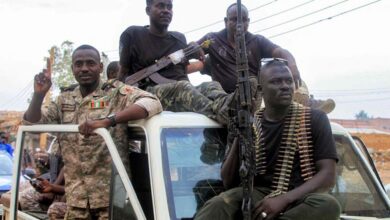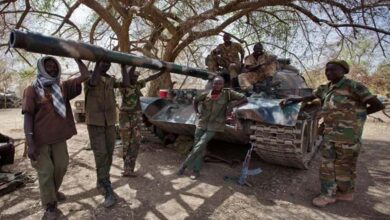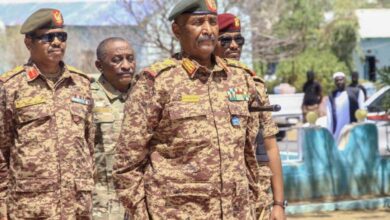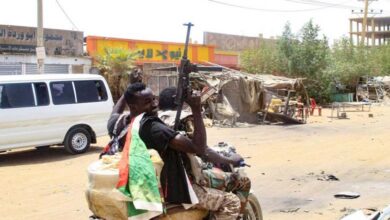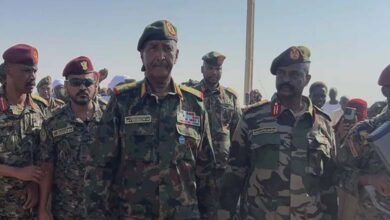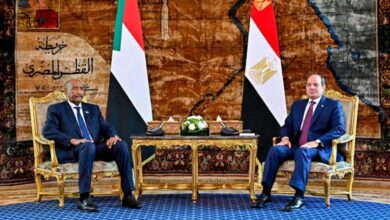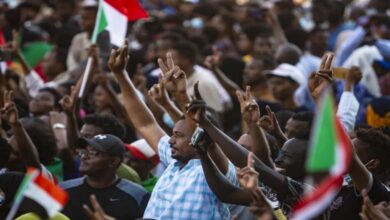Mohamed Ould El Ghazaouani… The Tranquil President of Mauritania
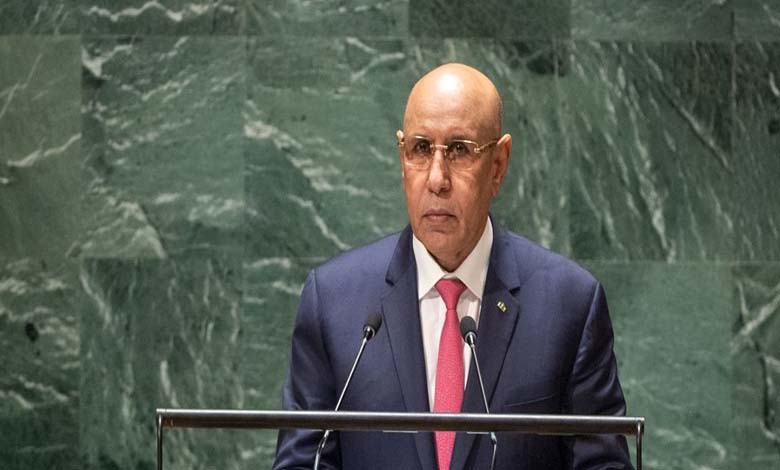
Two weeks ago, the outgoing president of Mauritania, Mohamed Ould Abdel Aziz, stood before tens of thousands of his supporters in the capital, Nouakchott, urging them to vote for his friend Mohamed Ould El Ghazaouani, whom he described as the “next president of Mauritania”. Ould El Ghazaouani stood by his side, looking at the ground, maintaining his usual calm, as if the conversation didn’t concern him, and indeed, the Mauritanians voted in favor of the man, electing him president of the country.
Mohamed Ould Abdel Aziz and his friend Mohamed Ould El Ghazaouani have had many other encounters that have changed the course of modern political history in Mauritania, leaving a strong imprint over the past two decades. The first of these encounters came when they together ousted in 2005, in a “bloodless” coup, President Maaouiya Ould Sid’Ahmed Taya, who had ruled the country for more than twenty years (1984 – 2005), and then when they stood behind the election of the civilian president Sidi Mohamed Ould Cheikh Abdallahi in 2007, shutting the door to the election of the historic opposition leader Ahmed Ould Daddah.
However, the two men quickly clashed with the president they had chosen as a civilian figurehead to lead the country. They faced a crisis with his parliamentary majority that led to a new “bloodless” coup in 2008, leading them to the firm conviction that it was difficult to govern the country from the shadows and that they had to assume direct power.
Ould Abdel Aziz resigned from the army in 2009 and ran for presidential elections to rule the country for ten years. At the end of his term, his friend Ould El Ghazaouani received a retirement message from the army, announcing his candidacy for the final presidential elections. And now, here he is winning them and becoming president of the country, succeeding his friend.
It became clear that things were going as the two men had planned nearly two decades ago, if not earlier, as the two men sat together in the classrooms of the Royal Military Academy in Meknes, Morocco, in the late seventies.
Man of the Shadows
Throughout their shared military and political journey, Mohamed Ould Abdel Aziz was the “man of the limelight”, while Mohamed Ould El Ghazaouani preferred to be the “man of the shadows”, surrounded by an aura of mystery and total secrecy. He took on many highly sensitive military tasks, such as leading military intelligence and national security, before spending years at the helm of the armed forces, where he waged a fierce battle against terrorism.
After retiring and entering the political arena, the man gradually entered the spotlight, cautiously, but he remains true to his habits of secrecy and discretion, despite his rise to the political scene and his sitting at the top of decision-making in the country.
Personal and Family Background
Mohamed Ould El Ghazaouani hails from the city of Boumdeid, a city characterized by its rural nature, located in the center of the country, near the Tichitt Plateau, with its huge black rock blocks that turn into uninterrupted waterfalls for several months… On the other hand, this city is located at the gateway to the major plains extending towards eastern Mauritania, connecting to the Sahara Desert.
Thus, Boumdeid was a suitable place for isolation, with its difficult-to-reach roads and its almost complete isolation from the outside world. These characteristics prompted the ancestors of Ould El Ghazaouani to found the city over a century ago, making it a center for a Sufi way of life based on asceticism and detachment from worldly goods, which enjoyed a wide reputation in Mauritania and beyond.
Chieftainship and Influence
In this atmosphere, Mohamed Ould El Ghazaouani was born in 1956, just four years before independence. He had four older half-brothers and one sister, his sister. His father, Sheikh Mohamed Ould Sheikh Ghazouani, was the successor to his grandfather, who was a spiritually, politically, and socially influential figure.
Consequently, Ould El Ghazaouani was raised in a chieftainship and influence house, and during his childhood, he came into contact with princes, tribal chiefs, and scholars, especially since his father’s house was never without a guest coming from one part of Mauritania. But the little boy who opened his eyes in this comfortable house began his life by turning to Quranic schools, where he memorized the Quran and studied some texts of Arabic language, the biography of the Prophet, and jurisprudence, as the future of one in his position and social status was already known, coming from a family of knowledge and Sufism.
As the child grew up, the young Mauritanian state tried to stand on its own feet, and the government of founding President Moktar Ould Daddah pushed the elites of communities and tribal chiefs towards teaching their children in “modern schools”. His father moved between Mauritanian cities and met with administrative officials of the young state, speaking to them about the future of the country and the importance of modern education, as well as the prospects it could offer to those enrolled. At that time, he decided that his son Mohamed would attend these schools, after having met the sufficient requirements of the “traditional mahadra”. This decision was unusual and unacceptable in his conservative and traditional society, but it changed the destiny of the child born between cliffs and vast plains.
Ould El Ghazaouani studied in many Mauritanian cities, from Keita in the center of the country, to Kiffa and Rosso in the far south, on the banks of the Senegal River, and finally to the capital Nouakchott on the shores of the Atlantic Ocean. At each stop, he rubbed shoulders with children and teenagers coming from different regions of Mauritania.
At first, he drew attention with his long name, Mohamed Ould Cheikh Mohamed Ahmed Ould El Ghazaouani, but later he transformed into that student whom everyone looks at with great respect. The Speaker of the Mauritanian Parliament, Sheikh Ould Baye, a former colonel in the Mauritanian army, says, “I studied with him in high school, in Rosso and Nouakchott, during the period from 1973 to 1976. He was the only one among us whom everyone respected. He had no problems with anyone, and after we joined the army, his relationship with everyone was good.”
Very Calm… and Firm
Ould El Ghazaouani, married to a dentist, with five children, three of them from previous marriages, is described by those close to him as very calm, yet he hides behind his calmness a great deal of seriousness and strictness. He listens more than he speaks, is cultured and literary, speaks refined Arabic, and has a respectable Francophone culture.
Ould El Ghazaouani joined the Mauritanian army “voluntarily” in October 1978, just three months after the first military coup in the country toppled the regime of founding President Moktar Ould Daddah. The army was then exhausted due to the Moroccan Sahara war and the painful blows it received from the “Polisario Front“, whose fighters were at the gates of the capital, Nouakchott.
The army overthrew the regime of Ould Daddah, declared withdrawal from the war, and the coup leaders appeared like heroes who saved the country from collapse. They appeared wearing their decorated military uniforms, waving victory signs amidst the joyful demonstrators in the streets of the capital, Nouakchott… It’s a scene that stuck in the minds of many Mauritanian youth during that period, and it prompted many of them to join the army, perhaps including Ould Ghazouani who led after nearly three decades two military coups.
After joining the army, he went to Morocco where he received military training at the Royal Military Academy in Meknes to graduate as an officer, along with his friend Mohamed Ould Abdel Aziz and other officers who were partners in the coups of 2005 and 2008, notably General Hannana Ould Sidi, who currently leads the joint military force of the five Sahel countries.
Ould El Ghazaouani obtained a Bachelor’s degree in Legal Studies, then a Master’s degree in Administrative and Military Sciences, and received advanced military studies and training in Jordan. He progressed through military positions and ranks until he was promoted in 2008 to the rank of General in the Mauritanian army alongside his friend Ould Abdel Aziz. He had previously served as head of military intelligence in 2004, and director of national security in 2005. In 2008, he became Chief of the National Staff, and in 2013 he became Chief of the General Staff of the Armed Forces, a position he held until his retirement at the end of last year (2018).
During October 2012, Ould Abdel Aziz was shot in the abdomen due to a mistake by a young officer who suspected his car passing by a military base north of the country. The president was urgently transferred to the French capital for treatment. At that time, the country remained in the grip of Ould El Ghazaouani, who refused demands from some to declare a vacancy in the presidency and ignored offers tempting him to overthrow his “wounded” friend, whose treatment took 45 days.
Since Ould El Ghazaouani took over as Chief of the National Staff in 2008, he held the file of the “war on terror” and succeeded in reforming the military institution, restructuring the Mauritanian army, doubling its armament, and waging a fierce war against the “Al-Qaeda in the Islamic Maghreb” organization whose fighters launched attacks in the neighborhoods of the capital, Nouakchott… However, the man’s security strategy stopped these attacks since 2011.
Criticism and Promises
While Ould El Ghazaouani succeeded in curbing the terrorist threat, he faced many criticisms, especially regarding military promotions where favoritism and clientelism were said to be practiced, and some officers were unfairly treated. He was also criticized for the failure of his strategy to curb crime, which rose dramatically in recent years, with some neighborhoods of the capital Nouakchott out of security coverage and controlled by gangs of robbery and looting, with armed robberies occurring in broad daylight at banks and shops.
Despite this, Ould El Ghazaouani raised the issue of security and development during his recent electoral campaign and made a series of promises that he said he would achieve over the next five years, including reducing poverty, combating corruption, and justice in wealth distribution, and settling human rights issues.
He confirmed that he would work to “fairly” treat what he described as the “deceived classes”, but the biggest promise he made was to dig a canal connecting the Senegal River to the city of Aleg, for a distance of more than 50 kilometers. This is a project that requires large resources and faces political and diplomatic obstacles that may affect relations with neighboring countries, especially Senegal and Mali, but the man is betting on the project to reduce poverty and unemployment. He also pledged in the same context to revitalize the agriculture sector by reclaiming 5,000 hectares annually for the benefit of the poorest classes, and encouraging the private sector to reclaim two thousand hectares annually on the banks of the river.
Many and significant promises were made by the man during his election campaign, but these promises did not obscure the fact that he inherits a country burdened with problems, from widespread unemployment and deteriorating education to a weak health sector, and even a social and racial crisis threatening security in the fragile country, making the man’s task difficult and complex.


